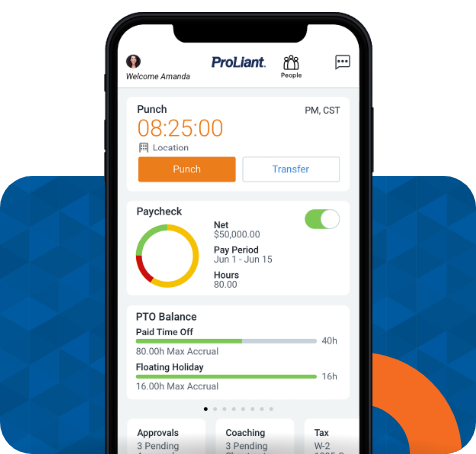Federal
Overtime Exempt Worker Minimum Salary Increase
The Department of Labor’s final ruling goes into effect on July 1, 2024. This will increase the standard salary level that salaried workers are entitled to overtime pay.
Starting July 1, most salaried workers who earn less than $844 per week ($43,888 annually) will become eligible for overtime pay under the final rule. The rule will also increase the total annual compensation requirement for highly compensated employees who are not entitled to overtime pay under the FLSA if certain requirements are met, from $107,432 per year to $132,964 per year, including at least $844 per week paid on a salary or fee basis.
Increase schedule:

Click here to learn more about what this new overtime rule means for workers.
New Taxes
Vermont Child Care Contribution (VT CCC)
REMINDER: Contributions to begin July 1, 2024. Employers are required to pay a 0.44% payroll tax on their employees’ wages. All wages that are subject to Vermont income tax withholding are also subject to the 0.44% CCC. Employees are not required to pay the CCC, but employers may choose to deduct and withhold up to 0.11% from employee wages.
Payment frequency will follow Vermont income tax withholding. Filing will be included with the quarterly Form WHT-436, Quarterly Withholding Reconciliation. Any employee contributions will be reported on Box 14 of the W-2.
State Updates
Ohio
Update to withholding tax rates take effect July 1, 2024. The highest tax rate used decreased to 3.8%, from 4.41%. The state’s supplemental tax rate remains 3.5%.
Connecticut
Change to paid sick leave requirements.
Current law applies to employers with 50 or more service workers. The service worker threshold is determined by the company's payroll for the week including October 1. This threshold will change as listed below:
- Effective January 1, 2025: Employers with 25 or more employees
- Effective January 1, 2026: Employers with 11 or more employees
- Effective January 1, 2027: Employers with 1 or more employees
The employee threshold will be determined by a company's payroll for the week containing January 1.
Exemption:
The new law no longer contains an exclusion for certain manufactures and nationally charted nonprofits; it excludes an employer that participates in a multiemployer health plan that is maintained pursuant to a collective bargaining agreement between a construction-related union and employer. Self-employed individuals are also excluded.
Use of time:
Under the expanded law, employees may use accrued sick time on and after 120 calendar days of employment. Previously, service workers may not use accrued sick time until they have worked 680 hours.
New provision:
An employer may not require an employee to find coverage for his/her shift.
Kansas
Kansas’ unemployment tax rate schedules is being updated by lowering rates for positive-rated experienced employers and increasing rates for negative-rated experienced employers. The seven schedules with the lowest tax rates will assign the most positively rated employers a zero percent tax rate, which is not possible under the state’s current rate schedules. A 0% will be allowed for contributing employers. Employers will be notified of any changes to their assigned rate. The bill also includes a provision that will subject the most negatively rated employers to the highest applicable tax rate for three consecutive calendar years. To avoid this, these employers will have to make a large enough voluntary contribution so that they are no longer the most negatively rated employers.
- The voluntary contribution program allows employers to reduce their unemployment tax rates by voluntarily reimbursing the state unemployment insurance trust fund.
- The deadline for voluntary contributions will be extended to 90 days following the date that experience rate notices are mailed to employers
The bill also adjusts tax rates for new employers. The rate will decrease to 5.55% from 6% for those in the construction industry, and to 1.75% from 2.7% for all others.
Minimum Wage Updates Effective July 1, 2024
California – Healthcare workers
Minimum wage increase for healthcare workers was postponed to go into effect July 1, 2024 from the original effective date of June 1, 2024
- $23.00 (large facilities and integrated systems)
- $18.00 (hospitals)
- $21.00 (clinics and all other health care facilities)
Alameda, CA
Minimum Wage to Rise to $17.00 from $16.50
Berkeley, CA
Minimum Wage to Rise to $18.67 from $18.07
Emeryville, CA
Minimum Wage to Rise to $19.36 from $18.67
Fremont, CA
Minimum Wage to Rise to $17.50 from $16.93
Los Angeles, CA
Minimum Wage to Rise to $17.28 from $16.78
Malibu, CA
Minimum Wage to Rise to $17.27 from $16.90
Milpatas, CA
Minimum Wage to Rise to $17.70 from $17.20
Pasadena, CA
Minimum Wage to Rise to $17.50 from $16.93
San Fransisco, CA
Minimum Wage to Rise to $18.67 from $18.07
Santa Monica, CA
Minimum Wage to Rise to $17.27 from $16.90
Chicago, IL
Minimum Wage to Rise to $16.20 for all business sizes
District of Columbia
Minimum Wage to Rise to $17.50 from $17.00
Minnesota
- Minneapolis: Minimum Wage to Rise to $ $15.57 (small employers), remains $15.57 (large employers) from $14.50 (small employers)
- Paul: Minimum Wage to Rise to $12.25 (micro employers), $14.00 (small employers), $15.57 (large employers), remains $15.57 (macro employers) from $11.50 (micro employers), $13.00 (small employers), $15.00 (large employers)
- Portland: Minimum Wage to Rise to $15.95 from $15.45
Nevada
Minimum Wage to Rise to $12.00 for all employers from $10.25 (with health benefits), $11.25 (without health benefits)
Oregon
- Non-rural counties: Minimum Wage to Rise to $14.70 from $14.20
- Rural counties: Minimum Wage to Rise to $13.70 from $13.20
- Portland: Minimum Wage to Rise to $15.95 from $15.45
Renton, WA
Minimum Wage determined $18.29 (mid-sized employers), $20.29 (large employers)
Tukwila, WA
Minimum Wage to Rise to $19.29 (small employers), remains $20.29 (large employers) from $18.29 (small employers)





No Comments Yet
Let us know what you think